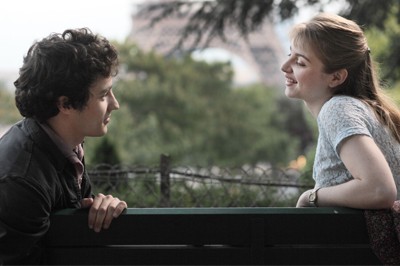| Reviews & Columns |
|
Reviews DVD TV on DVD Blu-ray 4K UHD International DVDs In Theaters Reviews by Studio Video Games Features Collector Series DVDs Easter Egg Database Interviews DVD Talk Radio Feature Articles Columns Anime Talk DVD Savant Horror DVDs The M.O.D. Squad Art House HD Talk Silent DVD
|
DVD Talk Forum |
|
|
| Resources |
|
DVD Price Search Customer Service #'s RCE Info Links |
|
Columns
|
|
|
My Golden Days
Magnolia Home Entertainment // R // March 18, 2016
List Price: Unknown [Buy now and save at Fandango]

Coming-of-age films offer an opportunity to provide a new perspective of youth, especially as times continue to change. However, most of these titles feature the lives of a white, middle-class teenage boy, and unfortunately, My Golden Days is no different there. However, it does manage to offer a different set of serious themes, including depression and how the past can haunt us through adulthood. While the lead's journey is quite extraordinary in nature, his emotions through such life experiences are incredibly relatable. My Golden Days is occasionally confused in its tone, although it remains to be a solid drama about depression and retrospect.
In his preparation to leave Tajikstan, Paul (Quentin Dolmaire [teenager], Mathieu Amalric [adult]) looks back upon his past. My Golden Days tells of his childhood, mother's suicide, trip to the USSR, and the love of his life. In this César Award-winning film, writer/director Arnaud Desplechin and co-writer Julie Peyr explore how one's adolescent experiences can forever haunt one's life.
Split into a series of chapters, My Golden Days chronicles Paul's life experiences. It begins with his childhood, as his mother's death and father's deep depression greatly impact his maturity. Executed similarly to that of a fairytale, the narrative is told via a voice-over. Paul often speaks about himself in the third person, displaying the regret and shame that he feels about specific aspects of his past. It's a subtle, yet brilliant way for the filmmaker to deliver an extra ounce of character without directly stating his emotions. As he continues to tell his story, these feelings clearly intensify. The longest chapter is the one titled "Esther," which tells of the first love of his life. The audience knows that it must have not ended well simply from the tone of his voice, although the feature's display of such feelings is quite powerful. The viewer is occasionally given the notion that he may be exaggerating portions of his narrative, which simply intensifies the message that the film is trying to convey.
The biggest challenge that many romantic coming-of-age features out there encounter is chemistry. There are a lot of moving elements, which each greatly contribute to our emotions towards the characters. My Golden Days pulls off its intimacy, as we truly believe that these two individuals yearn for one another. The romance is in both the writing and the acting. However, Paul and Esther clearly want each other for different reasons. Paul feels a great amount of lust for this beautiful young woman, which grows into an inevitable obsession. Meanwhile, we come to see that Esther has a low self-esteem, and requires the love and attention of men in order to thrive. Regardless, they become almost entirely dependent upon one another, resulting in near self-destruction when they are apart, which occurs quite frequently. However, Esther's depth is limited. This is a character that deserves a bit more of the spotlight, although it makes sense why it's more about Paul; it's from his perspective, after all.
My Golden Days doesn't explore much new ground outside of other coming-of-age films, although its ending pulls everything together in a way that makes the journey a bit more special. Paul is forced to confront an old friend years after the relationship was ultimately destroyed. This provides the audience with an anti-climactic conclusion that feels surprisingly fitting. It speaks volumes about the themes of regret and depression, which truly gives viewers plenty to discuss once the credits begin rolling. However, not everything leading to this point is as grand. There are several time jumps that occur over the course of the film, although it's tonally inconsistent. While they're visually well-executed, My Golden Days goes from crime thriller to romance without blinking an eye, which is more than a bit jarring.
One of the film's strongest assets include the performances. The entire cast provides a round of capable portrayals that bring the film to life. While Mathieu Amalric is quite good as adult Paul, Quentin Dolmaire and Lou Roy-Lecollinet are the stand-outs as teenage Paul and Esther, respectively. They both happen to be newcomers to the film world, yet have managed to deliver spectacular performances that provide a greater sense of honesty to the film. Roy-Lecollinet in particular is quite spectacular. She has what can easily be considered some of the most soul-shaking moments in the picture, as she reads the letters that she's writing to Paul while he's away. These scenes are raw and emotionally intense, as this is an excellent example of an actress pouring every ounce of emotion into a role.
While the feature doesn't provide much of a new perspective from the majority of other coming-of-age films out there, Desplechin has delivered a strong and engaging picture. It's tonally inconsistent through the beginning of the second act, although the romance and the elements of depression and regret are fantastic. There's a lot to like about this French drama, making it a worthwhile cinematic venture for those looking for something that feels real. My Golden Days offers a strong depiction of youth, depression, and regret. Highly recommended!

|
| Popular Reviews |
| Sponsored Links |
|
|
| Sponsored Links |
|
|
| Release List | Reviews | Shop | Newsletter | Forum | DVD Giveaways | Blu-Ray | Advertise |
|
Copyright 2024 DVDTalk.com All Rights Reserved. Legal Info, Privacy Policy, Terms of Use,
Manage Preferences,
Your Privacy Choices | |||||||











